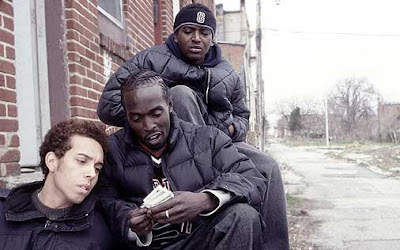 Yeah, it's a film blog. Guess what: I like comics too.
Yeah, it's a film blog. Guess what: I like comics too.Written by Jason Aaron
Illustrated by Roland Boschi with Dan Brown
Until a few minutes ago, I had never, in my entire life, read a good
Ghost Rider comics. Not for lack of trying; I probably own at least two dozen of them, purchased every couple of years when they dust ol' Flamehead off for another go around. Every one of them stunk. Back when I first started getting into comics in my teens, Marvel had two "cool" characters: the Punisher and Ghost Rider. Punisher I get (and I've read plenty of good-to-great Punisher mags in my day) but the appeal of GR has eluded me to this day. Okay yeah, he looks super cool, he's this "spirit of vengeance" who got his powers from an effed up deal with the devil, and he's this crazed firey-headed skull dude riding a Harley through the American West, but if that's all I'm gonna get out of a book, I can glance at the cover in the store and move on. I need something more.
At one point, there was a whole line of Ghost Rider books, called "The Midnight Sons" — you had the main
Ghost Rider series, then one called
Spirits of Vengeance where GR teamed up with Johnny Blaze, the former (and now current once again) Ghost Rider, plus one just for
Blaze. Not to mention that
all these other books where Ghost Rider would pop up for 22 pages, shout something like "TASTE VENGEANCE DEMON!" and then ride off into the sunset. In particular, I remember those god-awful story called "Midnight Massacre" where Ghost Rider lost his shit and then went around killing all the other characters in his line of books, but in the last issue, a deus ex machina brought them all back to life, meaning you'd literally wasted $15 (a lot of money to a kid whose allowance was — I shit you not — one or two bucks a week).
The crazy part? That's the stuff
Ghost Rider fans look back on as the good old days. That should tell you something about how the character's been treated over the last decade or so, and that doesn't even touch on the debacle that is Nicolas Cage getting his Wicker Man on all over their beloved character. In his most recent incarnation, Johnny Blaze became Ghost Rider again (probably because that's the version Cage played in the film adaptation) and then, just recently, a writer dropped a bombshell: the character hadn't, as has always been the tale, sold his soul to the devil. Rather, Mr. Blaze's condition was all the result of the machinations of some "rogue angel" and Ghost Rider, is, in fact, an
angel of vengeance.
Sounds like a pretty noxious idea to me but that's why they pay Jason Aaron to write the book; his first issue is #20 and it's this poor guy's job to pick up the pieces and make something interesting out of this whole new status quo. Somehow he did it.
The secret, I think, has nothing to do the way he's writing Ghost Rider, and everything to do with writing Johnny Blaze. When I was kid, the humans in
Ghost Rider were all bland, generic protagonists. They were supposed to be tortured, I guess, saddled with this hellish burden, but as written they just sounded like whiners. Not Aaron's Blaze: this dude sounds like a badass biker who's
PISSED OFF about the fact that his head catches on fire anytime shit starts to go wrong around him. Issue #20 opens with Blaze confessing to a priest as a means to try to get a message to heaven: he doesn't know how, but he's coming up there to settle the score. And when he gets there it ain't gonna be pretty. The dude's basically Howard Beale by way of Sonny Barger. If that doesn't sound like a pretty amazing subject for a story, well I can't do nothing for you.
There's a lot of groundwork laid here — you gotta pave the road before you can drive your hellcycle across it I guess — but I love the world Aaron's building. He hints that the "angels" in heaven may be even nastier than the demons in hell, and he creates this whole crazy cult of Nurse Ratchets with shotguns who are doing their bidding. In short, it's a nasty little world with horrible people in it: the only sort of place, in other words, where a guy on a bike fueled by hellfire might be considered something of a hero. And I kinda get this guy now: he's the guy who sees the "Caution! Hazardous Road Ahead!" sign on the side of the road and hits the gas. Because he just doesn't give a shit.
The art by Roland Boschi isn't phenomenal; his scratchy style isn't really to my taste and he seems to be allergic to drawing anyone with a neck, but his storytelling is fine and his layouts work with Aaron's script. The whole book moves; sometimes a comic that read quick annoys me because I'm paying $3 I should at least get a few minutes of enjoyment out of it. This one flows nicely, and it picks up steam as it hits the big action sequence in the hospital with the psychobitch nurses and the creepazoid cliffhanger.
It's just a great read and look, it got me all pumped up. About friggin'
Ghost Rider. This is what a good art does. It excites you. It makes you want to share it. It makes you want to get on your computer at 12:30 AM on a Saturday morning when you could be writing something for money, or playing Super Mario Galaxy or (heaven forbid) sleeping to tell people how freaking good it is. So here I am. Telling it.
Labels: Comic Books












